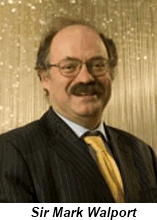|
News & Views item - July 2012 |
![]() Mark Walport, Director of Wellcome Trust, to be Next UK's Chief Scientific
Advisor. (July 1, 2012)
Mark Walport, Director of Wellcome Trust, to be Next UK's Chief Scientific
Advisor. (July 1, 2012)
 Sir
Mark Walport (59), since 2003 Director of UK's major biomedical charity, the
Wellcome Trust, has been chosen to take over the role of the United Kingdom's
chief scientific advisor in April next year. He will take over from population
biologist John Beddington who has held the position since 2008.
Sir
Mark Walport (59), since 2003 Director of UK's major biomedical charity, the
Wellcome Trust, has been chosen to take over the role of the United Kingdom's
chief scientific advisor in April next year. He will take over from population
biologist John Beddington who has held the position since 2008.
In a prepared statement Professor Walport said that science, engineering and technology "are critical both to economic recovery and growth, and to addressing many of the greatest challenges of our time, such as environmental change and the ageing population. I look forward to working with colleagues both inside and outside Government to ensure that the best possible advice can be provided from the most expert sources, based on the strongest evidence, to facilitate the wisest possible policy decisions."
The announcement has has been well received by the scientific community. Royal Society president Nobel Laureate Paul Nurse said: "The position of the Government's Chief Scientific Advisor will be hugely important over the coming years. They will have to make sure that evidence is at the heart of policy making. ... I'm sure that, in Mark Walport, we have absolutely the right person for the job," while Colin Blakemore, former head of the U.K. Medical Research Council stated: "Mark Walport is bright, efficient and enormously knowledgeable about science, education and innovation. But, equally important, he has great political acumen and robust independence. I can't think of anyone better prepared to make the case for the use of science in government and for the defence of the best of British science."
The BBC's science correspondent Pallab Ghosh in assessing the appointment writes that during the appointment of Professor Beddington the role of chief scientific advisor "is seen to require more administrative skills [for example he] oversees a large Government Office for Science and is required to oversee the scientific work of all other government departments. It is probably for this reason that Professor Walport has been appointed, [and] Prof Walport's first big test according to Bob Ward, who worked closely with a former chief scientist, Lord May, is to reverse the cutbacks in research spending".
However as Mr Ghosh notes: "Professor Walport's predecessors have overseen the development a formidable system of collecting and disseminating scientific advice across Whitehall. At the heart of this system is a network of scientific advisors in each government department. [However,] the problem is that the system is not taken seriously by the arts-dominated civil service." In short will the straight talk Mark Walport move forward "evidence-based policy-making in the way it was designed to rather than its advice fall on deaf ears".